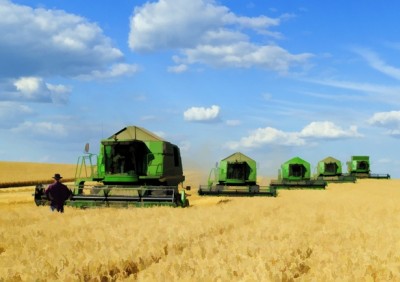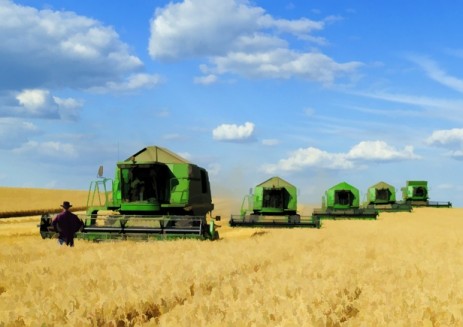 Image: Tom Twigg for GristThere are those who would like us to believe that industrialized farming is the only way to feed the earth’s growing population. Disinformation comes daily from powerful industrial agricultural companies whose profits depend entirely on the sale of chemicals, genetically modified (GM) seeds, and food processing. Furthermore, they maintain that massive-scale farming methods are key to adapting to climate change.
Image: Tom Twigg for GristThere are those who would like us to believe that industrialized farming is the only way to feed the earth’s growing population. Disinformation comes daily from powerful industrial agricultural companies whose profits depend entirely on the sale of chemicals, genetically modified (GM) seeds, and food processing. Furthermore, they maintain that massive-scale farming methods are key to adapting to climate change.
This is just not so.
Contrary to what the propaganda tells us, yields from industrial crops do not consistently produce more food. It’s an industry-generated myth that ecologically-safe organic agriculture yields less than conventional agriculture. In fact, a comprehensive study comparing 293 crops from industrial and organic growers demonstrates that organic farm yields are roughly comparable to industrial farms in developed countries; and result in much higher yields in the developing world.
Numerous studies unequivocally state that our survival depends on resilient and biodiverse farm systems that are free of fossil fuel and chemical dependencies. The 2008 World Bank and United Nations International Assessment on Knowledge, Science and Technology concluded that a fundamental overhaul of the current food and farming system is needed to get us out of both the food and fuel crises. The report’s findings indicated that small-scale farmers and agro-ecological methods are the way forward.
This assessment dovetails with a 2002 United Nations Food and Agriculture Organization (FAO) report, which found that organic farming enables ecosystems to better adjust to the effects of climate change and has major potential for reducing agricultural GHG emissions. The FAO report also found that organic agriculture performs better than conventional agriculture in terms of both direct energy consumption (fuel and oil) and indirect consumption (synthetic fertilizers and pesticides).
Large-scale agriculture-dependent upon commercial seeds (including GM seeds), chemical sprays, and petroleum-based fertilizers-can only reliably feed one thing: company profits. These profits come at the expense of our climate as well as farmers who become wholly dependent upon these companies for their livelihood.
And it’s farmers who are realizing through hard experience that this system doesn’t work. Monsanto, a major proponent of GM seeds, agro-chemicals and industrialized methods, this week reports a massive $283 billion loss in the third quarter-quite a hit.
Monsanto and others in the industry are scrambling for a foothold in developing nations to save a failed agricultural and business model in the U.S. They’re trying to convince foundations, aid agencies, and foreign governments that they hold the only key to staving off starvation. And, the way to do this is by smearing organic farming – which is the only truly dependable way to feed the world – and by ignoring climate change.
They’re putting their shareholders’ bottom line before a sick and hungry planet. It’s time we held them to the truth.



